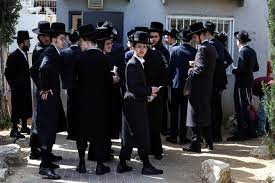JERUSALEM (AFP): A legal row over controversial exemptions from compulsory military service for Israel’s ultra-Orthodox Jews had the country’s right-wing coalition government scurrying to find a compromise Thursday.
Attorney General Gali Baharav-Miara sent shock waves through the government — which is reliant on ultra-Orthodox parties — declaring Wednesday there was no legal framework to the continuing exemptions.
This means that ultra-Orthodox will be liable to be called up from April 1, as Israel’s war against Hamas militants rages in the Gaza Strip.
The government has set itself a Thursday deadline to strike a deal.
With the war in Gaza, pressure has increased on the country’s large and growing ultra-orthodox community who have long been spared military service which is compulsory for everyone else.
After several legal challenges to the exemptions, the Supreme Court gave the government until Wednesday to draw up a new conscription bill.
But Prime Minister Benjamin Netanyahu has been unable to get agreement on the deeply divisive issue, with his ultra-Orthodox allies fiercely opposed to conscription for their community.
The government has asked for a short extension to the Supreme Court deadline in the hope of formulating a deal.
The coalition depends on two large ultra-Orthodox parties.
Last year the government voted through unprecedented funding equivalent to just over $1 billion for orthodox religious schools, or yeshivas.
Netanyahu is working, at any cost, on “avoiding an early election” that would benefit Benny Gantz, a centrist member of his war cabinet, Yohanan Plesner, president of the Israel Democracy Institute think tank, has said.
Recent polls suggest that if there were an election, Gantz’s party would win the largest number of seats.
Before the war in Gaza, the religious parties had also supported Netanyahu’s controversial judicial reforms, in the hopes of further extending military exemptions.
The judicial revamp sparked months of protests, often by tens of thousands of Israelis.
But Defense Minister Yoav Gallant in February announced a reform of military service that would include the ultra-Orthodox. Some Israeli media perceived Gallant’s move as a challenge to Netanyahu. Both men belong to the same Likud party.
Military service is obligatory for all young Israelis — 32 months for men, and two years for women.
But almost all the ultra-Orthodox have been able to escape it, with 66,000 members of the community excused from military service last year alone.
Jewish men who study the Torah full-time in religious schools have long been granted an annual deferment from military service until the age of 26, at which point they become exempt.
Young ultra-Orthodox women are automatically exempt.
The exemptions date from Israel’s founding in 1948, and were meant to allow a group of 400 young people to study sacred texts and preserve Jewish traditions, much of which had been lost during the Holocaust.
But today’s ultra-Orthodox number 1.3 million people, according to the Israel Democracy Institute — bolstered by a fertility rate of more than six children per woman, compared with the national average of 2.5.
Most ultra-Orthodox want the exemptions to be extended to all religious students, saying serving in the military is incompatible with their values.







